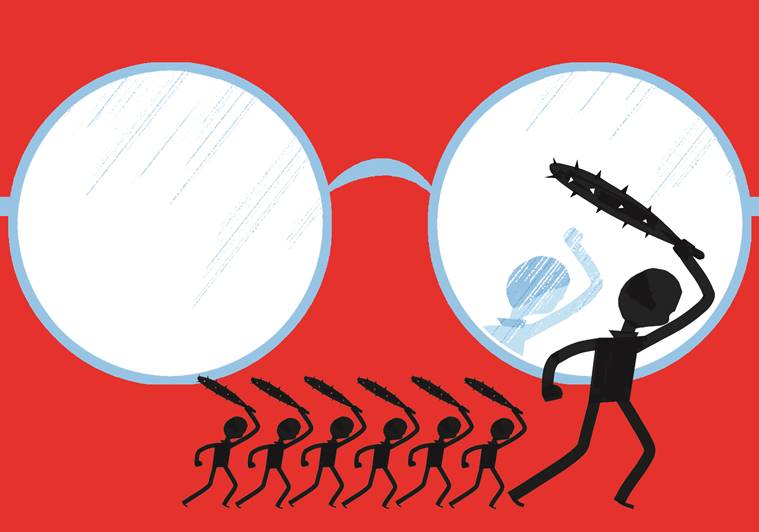Gandhi for the young
His ideas like ‘soul force’ and ‘gentle anarchy’ can give young people an effective philosophy and practice of resistance against new forms of social control.

Think of the way we are losing control over ourselves. With an almost neurotic preoccupation with gadgets, or the intensification of the desire for the ever-expanding “manufactured” needs, we lose the courage to resist the way technocratic capitalism with its seductive consumerism enslaves us. (Illustration: C R Sasikumar)
Every year on October 2, I feel somewhat uneasy. From Rajghat to Parliament, from the declaration of “pro-people” policies to the empty slogan initiated by the political class, I experience the death of Gandhi. As the packaging of the “official” Gandhi becomes the norm, I do not find the real/living Gandhi — the “experimental” Mohandas who could acquire the courage to resist the dictates of the “caste association”, and choose to go to England for higher studies; the pedagogue Gandhi in Tolstoy Farm seeking to integrate the “mental” and the “manual” for nurturing the foundations of “integral education”; the creative Gandhi transforming the everydayness of “salt” into a mass movement; and the determined Gandhi with his frail body walking through the villages of Noakhali with a lamp of truth amid the all-pervading darkness. Instead, the ritualisation centred on Gandhi, or the attempt to reduce him into a statist symbol, I fear, has kept many — particularly, the radical youth — separated from him.
Even though they speak of Bhagat Singh and Ambedkar, and romanticise Marx and Che, it is not so easy to find them engaging with Gandhi in a meaningful and creative way. It is sad that, because of a massive pedagogic failure, Gandhi, for many of them, is being perceived primarily as a “non-modern” “puritan” conservative with all sorts of “impractical” postulates. As a teacher and concerned citizen, I believe that this must change, and we ought to invite them to the world of living Gandhi — not a perfect, fossilised, museumised Gandhi, but a Gandhi with follies and contradictions, and yet endowed with immense possibilities.
Before I go further, it is important to see the relationship between radicalism and the spirit of courage. As we read Bhagat Singh’s diary — particularly his note on why he was an atheist — we experience an inspiring illustration of courage. The courage to retain the clarity of thought and conviction even amid the worst form of psychic turmoil, or the courage not to find “false consolation” by deriving the idea of God and “next life”.
No wonder, it attracts the young. But then, what about Gandhi? Well, his religiosity was no less an illustration of courage — the courage to retain the spirit of cultural syncretism even at a time when the likes of Savarkar and Jinnah were engaged in communalising the socio-political sphere. While Ambedkar’s “Mahad satyagraha” was an inspiring example of courage — the courage of the subaltern to defy the Brahminical principles — Gandhi sought to inject yet another notion of courage in our consciousness, the courage to fight the aggression of the hyper-masculine colonial modernity through the spirit of “non-cooperation”, the ethics of satyagraha, and the cultivation of the qualities like endurance and even the “art of dying” by reducing oneself to “zero”.
Marx died in the late 19th century. Yet, with the dynamic character of modern capitalism with its hegemonic apparatus and culture industry, creative Marxists like Antonio Gramsci and Herbert Marcuse reinvented Marx, and made his essential spirit of criticality relevant for our age. Likewise, I believe, it is not altogether impossible to reinvent Gandhi in the changing times, and evolve a new language of resistance. From Gandhi’s time of colonialism, religious reform and nationalist movement, we seem to have moved towards a new reality characterised by what I would regard as a mix of neoliberal capitalism and militant cultural nationalism, and market-driven consumerism and technocratic developmentalism. See its consequences as manifested in the politico-cultural landscape: While the seductive slogan of “good governance” hides the growing cleavage between the rich and the poor, the city and the village, and techno-managers and farmers, the practice of cultural nationalism promotes the militarisation of consciousness, and the expanding culture industry transforms the aspiring middle-class into greedy consumers and non-reflexive recipients of all sorts of “apps” and techno-solutions. The result is violence with diverse manifestations ranging from the emergence of a “risk society” with environmental degradation to the normalisation of the brute practice of stigmatising the “other” through lynching and cow vigilantism, from the rapidly growing pornographic mentality to all sorts of conservatism relating to caste, religion and gender. The question is whether the sensitive youth can find something in Gandhi to come out of this insanity.
It is in this context that I would refer to two important ideas of Gandhi — “soul force” and “gentle anarchy”. In Hind Swaraj, Gandhi contrasted “soul force” with “brute force”. While “brute force” is based on intoxication with endless craving for all sorts of “needs”, “soul force” cultivates the power of the self, our inner resources, and our ability to have control over body, diet and life’s needs. If we refer to Erich Fromm, he too would agree with Gandhi, and speak of “having” and “being”. While modern capitalism and consumerism intensifies the “having” mode of existence, it is inherently violent. Every relationship, be it with nature or other fellow beings, becomes instrumental. In contrast, the “being” mode of existence, like Gandhi’s “soul force”, helps us to find the treasure within, and regain our moral strength. Think of the way we are losing control over ourselves. With an almost neurotic preoccupation with gadgets, or the intensification of the desire for the ever-expanding “manufactured” needs, we lose the courage to resist the way technocratic capitalism with its seductive consumerism enslaves us. I believe that Gandhi’s “soul force” — if meaningfully reinvented in our times — can give the youth an effective philosophy and practice of resistance against this new form of social control.
There is something remarkable in Gandhi’s “gentle anarchy” — his scepticism towards the gigantic power of the state with its inherent centralising/bureaucratic tendencies. In a way, as Gandhi thought, it disempowers people, and, as Hind Swaraj suggested, makes them terribly dependent on “courts and lawyers”. His plea for what he regarded as “oceanic circles” or self-reliant decentralised communities, I admit, has to be critically scrutinised. Yet, the spirit of it — I mean the ethico-political power of the people rather than a bureaucratic state or an all-pervading “authoritarian personality” — has immense potential for democratising our society and eradicating the seeds of authoritanism.
On January 30, 1948, when he was walking to attend the prayer meeting in Birla House in Delhi, he was trying to see sanity in the insane Subcontinent. It is, however, a different story that Nathuram Godse or the militaristic ideology of nationalism that created him, thought otherwise. Do the youth realise that killing Gandhi is like killing a dream, a possibility; and this demonic force has not yet disappeared from our society?
The writer is professor of Sociology at JNU
For all the latest Opinion News, download Indian Express App
More From Avijit Pathak
- The radical monkVivekananda needs to be understood more meaningfully. His engaged religiosity can help create a spiritually enriched, egalitarian society..
- In troubled times, walk with the poetAs militant nationalists create an environment of fear and violence, Tagore reminds us of the possibility of exploring India as a civilisation — not merely…
- The presence of Nehru’s absenceWe have lost what made his ‘discovery’ possible — a spirit of nuanced dialogue, decolonised cosmopolitanism and cultural syncretism...








































No hay comentarios:
Publicar un comentario